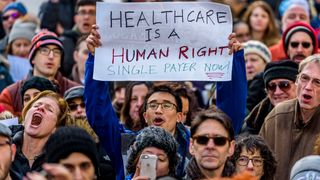Australians report higher levels of anxiety than Americans on issues like climate change, and virtually identical levels of anxiety about the affordability of healthcare despite Australia’s stronger social safety net, according to new research from the United States Studies Centre (USSC) at the University of Sydney.
The comparison of self-reported anxiety in both Australia and the United States was conducted as part of an ongoing polling partnership between the USSC and YouGov. The survey asked respondents how often they felt anxious about scenarios including losing their job or business, not being able to afford healthcare, failure at work and climate change.
USSC Innovation and Entrepreneurship Program Director Claire McFarland said that despite the common perception that healthcare costs in the United States are out of control and highly stressful for many Americans — and that Medicare provided Australians with a safety net — respondents in both countries showed similar levels of anxiety about this issue.
"This suggests that Australian policymakers cannot be complacent about the perceptions and reality of the costs of medical care in Australia," McFarland said.
“Across a range of issues, the USSC-YouGov poll found that Australians are as, or more likely, to report anxiety than Americans. This surprised us, with Australians often considered fairly easygoing, and Americans seen as a far more anxious, stressful society.”
The survey found a large gap between the levels of reported anxiety of low- and high-income Americans. Those with higher incomes were much less likely to say they were anxious about the items polled. The difference in anxiety between higher and lower income Australians was much smaller.
“Young Australians were also found to be particularly anxious across a range of issues,” McFarland said.
CEO of the United States Studies Centre, Professor Simon Jackman, noted that while Australians were generally more likely to report anxiety, that local partisan differences were smaller than in the United States.
“Democrats and Republicans disagree on many things these days. This is a trend that began long before Donald Trump’s election. As with many other areas, there is a degree of partisan polarisation on anxiety,” Jackman said.
“In Australia, we do not find the same clear partisan differences. Coalition voters are less anxious about the cost of healthcare or climate change, but Trump voters were simply less anxious about everything we asked.
“These lower levels of anxiety reported by Trump voters might be driven by their preferred candidate being in the White House now, but it matches other research that indicates Trump supporters were mostly middle-class voters, not the disadvantaged. This implies that his supporters backed him for reasons other than economic anxiety.”
Key findings
- Australians are more likely to express anxiety than Americans. This was largely because high-income Americans generally expressed very low levels of anxiety.
- Australians were especially more anxious than Americans with respect to ‘losing everything and having to start from scratch’ (7 per cent), ‘failure at work’ (6 per cent) and ‘climate change’ (5 per cent). There were no differences between the two countries for ‘being hit by a car’ and ‘not being able to afford healthcare’.
- Low-income respondents were more anxious across most questions in both countries. This income anxiety gap was larger in the United States than Australia on every item, with high-income Americans expressing very low levels of anxiety compared with those in the bottom third.
- The income difference in reported anxiety was particularly pronounced in Australia on ‘being able to afford healthcare’ (11 per cent gap between those with family incomes in the top and bottom thirds) and ‘losing everything and having to start from scratch’ (9 per cent difference). In the United States the income gap was largest on ‘losing everything and having to start from scratch’ (22 per cent) and ‘not being able to afford healthcare’ (18 per cent).
- In both countries, respondents aged 18-34 reported greater rates of anxiety than older respondents, and those 55 and over the lowest. The age anxiety gap was larger in Australia though, and particularly pronounced on failure at work (a 28 per cent gap between the over 55 and 18-34 groups in Australia) and losing a job or business (23 per cent).
- In the United States, white respondents were less anxious on four of the six item asked, except ‘Not being able to afford health care’, and ‘Climate change’, where they were similar with other respondents.
- There was a larger partisan anxiety gap in the United States than Australia. This is largely driven by Republican (Trump) voters being less anxious about the items we asked than Democratic (Hillary Clinton) supporters. This difference was particular large for climate change. Conversely, there was generally little overall difference between Labor and Coalition voters in Australia.
- Much of this was driven by age, race and income, with Trump voters generally older, whiter and richer than Clinton supporters. White, wealthier and older Americans were generally less likely to report anxiety on the issues asked about in the survey.
- Only 6 per cent of Trump-supporting Americans feel anxious about climate change compared to 20 per cent of Coalition voters.
- The difference on attitudes on climate between left-wing and right-wing voters in the United States (30 per cent) is significantly greater than the difference in Australia (10 per cent).
- Even after controlling for income, race and age, voting for Trump in 2016 predicted a slightly lower level of overall anxiety in the US, but the effect was smaller than income, age or race.
The technical part
The United States Studies Centre and YouGov surveyed 1,073 respondents in Australia and 1,205 respondents in the United States in early March 2018. These respondents were recruited from YouGov’s online panel.
In random order, respondents to this survey in both countries were asked How often do you feel anxious about:
- Losing my job or business
- Not being able to afford health care
- Being hit by a car
- Failure at work
- Losing everything and having to start from scratch
- Climate change
Responses were weighted by YouGov to ensure samples representive of the Australian and American populations. The Australian sample was weighted by age, gender, education, region (crossed with city, non-city) and vote at the 2016 Australian federal election. The US sample was weighted by age, gender, race, education, region, voter registration, and vote choice in the 2012 and 2016 presidential elections.
The maximum margin of error is approximately ± 3 percentage points for results reported for the full sample of both the Australian and American surveys. It is larger for sub-groups of the full samples and for differences between the countries.
Detailed results
Overall
How often do you feel anxious about…
| Australia (%) | United States (%) | Difference (%) | |
|---|---|---|---|
| Losing my job or business | 21 | 19 | 2 |
| Not being able to afford health care | 30 | 31 | -1 |
| Being hit by a car | 17 | 16 | 1 |
| Failure at work | 24 | 18 | 6 |
| Losing everything and having to start from scratch | 30 | 23 | 7 |
| Climate change | 26 | 21 | 5 |
By income
How often do you feel anxious about…
| Family income | Australia (%) | United States (%) | Difference (%) |
|---|---|---|---|
| Losing my job or business | |||
| High | 21 | 5 | 16 |
| Middle | 27 | 16 | 11 |
| Low | 19 | 22 | -3 |
| Not being able to afford health care | |||
| High | 25 | 18 | 7 |
| Middle | 29 | 27 | 2 |
| Low | 36 | 36 | 0 |
| Being hit by a car | |||
| High | 15 | 9 | 6 |
| Middle | 15 | 9 | 6 |
| Low | 19 | 21 | -2 |
| Failure at work | |||
| High | 25 | 11 | 14 |
| Middle | 25 | 16 | 9 |
| Low | 24 | 21 | 3 |
| Losing everything and having to start from scratch | |||
| High | 24 | 5 | 19 |
| Middle | 29 | 20 | 9 |
| Low | 33 | 27 | 6 |
| Climate change | |||
| High | 27 | 17 | 10 |
| Middle | 24 | 21 | 3 |
| Low | 28 | 23 | 5 |
| Total | |||
| High | 23 | 11 | 12 |
| Middle | 25 | 18 | 7 |
| Low | 27 | 25 | 2 |
Difference in anxiety between high and low income earners
| Australia (%) | United States (%) | Difference (%) | |
|---|---|---|---|
| Losing my job or business | 2 | -17 | 19 |
| Not being able to afford health care | -11 | -18 | 7 |
| Being hit by a car | -4 | -12 | 8 |
| Failure at work | 1 | -10 | 11 |
| Losing everything and having to start from scratch | -9 | -22 | 13 |
| Climate change | -1 | -6 | 5 |
| Total | -4 | -14 | 10 |
By age
How often do you feel anxious about…
| Age | Australia (%) | United States (%) | Difference (%) |
|---|---|---|---|
| Losing my job or business | |||
| 18 to 34 | 32 | 27 | 5 |
| 35 to 54 | 25 | 21 | 4 |
| 55 and over | 9 | 10 | -1 |
| Not being able to afford health care | |||
| 18 to 34 | 35 | 32 | 3 |
| 35 to 54 | 28 | 34 | -6 |
| 55 and over | 28 | 27 | 1 |
| Being hit by a car | |||
| 18 to 34 | 25 | 24 | 1 |
| 35 to 54 | 15 | 11 | 4 |
| 55 and over | 11 | 13 | -2 |
| Failure at work | |||
| 18 to 34 | 38 | 30 | 8 |
| 35 to 54 | 28 | 19 | 9 |
| 55 and over | 10 | 9 | 1 |
| Losing everything and having to start from scratch | |||
| 18 to 34 | 40 | 31 | 9 |
| 35 to 54 | 29 | 26 | 3 |
| 55 and over | 23 | 14 | 9 |
| Climate change | |||
| 18 to 34 | 33 | 24 | 9 |
| 35 to 54 | 20 | 23 | -3 |
| 55 and over | 25 | 18 | 7 |
| Total | |||
| 18 to 34 | 34 | 28 | 6 |
| 35 to 54 | 24 | 22 | 2 |
| 55 and over | 18 | 15 | 3 |
Difference in anxiety between older and younger respondents
| Australia (%) | United States (%) | Difference (%) | |
|---|---|---|---|
| Losing my job or business | -23 | -17 | -6 |
| Not being able to afford health care | -7 | -5 | -2 |
| Being hit by a car | -14 | -11 | -3 |
| Failure at work | -28 | -21 | -7 |
| Losing everything and having to start from scratch | -17 | -17 | 0 |
| Climate change | -8 | -6 | -2 |
| Total | -16 | -13 | -3 |
By race (United States only)
How often do you feel anxious about…
| Race | Americans expressing anxiety (%) |
|---|---|
| Losing my job or business | |
| Black | 24 |
| Hispanic | 35 |
| Other | 26 |
| White | 14 |
| Not being able to afford health care | |
| Black | 29 |
| Hispanic | 44 |
| Other | 32 |
| White | 29 |
| Being hit by a car | |
| Black | 17 |
| Hispanic | 34 |
| Other | 25 |
| White | 11 |
| Failure at work | |
| Black | 20 |
| Hispanic | 32 |
| Other | 31 |
| White | 14 |
| Losing everything and having to start from scratch | |
| Black | 28 |
| Hispanic | 35 |
| Other | 27 |
| White | 19 |
| Climate change | |
| Black | 22 |
| Hispanic | 30 |
| Other | 19 |
| White | 20 |
| Total | |
| Black | 23 |
| Hispanic | 35 |
| Other | 27 |
| White | 18 |
Vote in 2016
How often do you feel anxious about…
| Vote in 2016 | Australia (%) | United States (%) | Difference (%) |
|---|---|---|---|
| Losing my job or business | |||
| Left | 22 | 18 | 4 |
| Other | 23 | 23 | 0 |
| Right | 19 | 12 | 7 |
| Not being able to afford health care | |||
| Left | 32 | 32 | 0 |
| Other | 34 | 33 | 1 |
| Right | 26 | 24 | 2 |
| Being hit by a car | |||
| Left | 16 | 16 | 0 |
| Other | 16 | 19 | -3 |
| Right | 17 | 10 | 7 |
| Failure at work | |||
| Left | 23 | 19 | 4 |
| Other | 26 | 22 | 4 |
| Right | 24 | 11 | 13 |
| Losing everything and having to start from scratch | |||
| Left | 27 | 21 | 6 |
| Other | 30 | 28 | 2 |
| Right | 32 | 16 | 16 |
| Climate change | |||
| Left | 30 | 36 | -6 |
| Other | 29 | 21 | 8 |
| Right | 20 | 6 | 14 |
| Total | |||
| Left | 25 | 24 | 1 |
| Other | 26 | 24 | 2 |
| Right | 23 | 13 | 10 |
Difference in anxiety between supporters of left and right parties/candidates
| Australia (%) | United States (%) | Difference (%) | |
|---|---|---|---|
| Losing my job or business | -3 | -6 | 3 |
| Not being able to afford health care | -6 | -8 | 2 |
| Being hit by a car | 1 | -6 | 7 |
| Failure at work | 1 | -8 | 9 |
| Losing everything and having to start from scratch | 5 | -5 | 10 |
| Climate change | -10 | -30 | 20 |
| Total | -2 | -11 | 9 |
Estimating influences on anxiety in the United States
| Variables | Coefficient | (SE) |
|---|---|---|
| Intercept | 0.24 | 0.04 |
| Race: Hispanic | 0.12 | 0.04 |
| Race: Other | 0.02 | 0.04 |
| Race: White | -0.03 | 0.03 |
| Age: 35 to 54 | -0.05 | 0.02 |
| Age: 55 and over | -0.10 | 0.02 |
| Income: Middle | 0.04 | 0.03 |
| Income: Low | 0.09 | 0.03 |
| Voted Other 2016 | -0.03 | 0.02 |
| Voted for Trump 2016 | -0.07 | 0.02 |
Background to the USSC-YouGov poll
In September 2017, the United States Studies Centre partnered with global survey company YouGov, which now provides the Centre with exclusive, monthly polling data from the United States and Australia. These surveys track perceptions of political leadership in both countries, and unique, targeted insights on a diverse range of topics.
CEO of the United States Studies Centre Professor Simon Jackman, a leader in public opinion research, has previously worked as one of the principal investigators of the American National Election Studies and partnered with media outlets including the Guardian Australia and the Huffington Post on pre-election polling. He said the results provided by YouGov as part of the new partnership will allow the Centre to analyse and publish unprecedented comparative data.
“The United States Studies Centre has taken a keen interest in the attitudes and opinions of people in our region, with research like our surveys into America’s role in the Indo-Pacific. This exciting new partnership with YouGov gives us the opportunity to broaden that focus to public opinion in the United States and then contrast that with the views of people in our own backyard,” Jackman said. “The Centre has a mandate to deepen Australia’s understanding of America. This ongoing commitment to charting public perceptions in both countries is an ideal way for Australians to gain perspective on the United States.”
YouGov is a market research and opinion polling company headquartered in the United Kingdom, with operations in Europe, North America, the Middle East and the Asia-Pacific.









